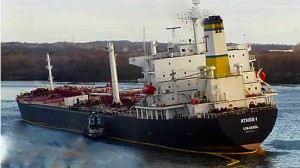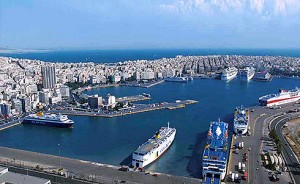Note: This novel was WINNER of the National Award for Best Greek Novel of 2007.
“An Avgoustis does not die on dry land, and [Mitsos Avgoustis], in particular, would never take part in that old age which slowly and wordlessly undulates from one train stop to the next, from the left side of the sidewalk to the opposite, from the morning bench of this square to the afternoon bench of that one.”
Dimitrios Avgous tis, now seventy-five, has been a seaman in the Greek merchant marine for 58 years, a captain for much of that time, well respected by his crew. He is less respected by his family, however, especially by his less than steadfast wife Flora, an embittered, angry woman who was going to separate from him before she became pregnant with their son Andonis, twenty-two years ago. Dimitrios, known to various acquaintances as Mitsos or Mimi, has not seen his family for years, has two daughters who hate him, a five-year-old granddaughter he has never seen, and a twenty-two year-old son who desperately wants a father but has never known him. Mitsos has not written a letter home or looked at any photographs of his family in years. “I love my family but from a distance of ten thousand miles,” he says, and for the last ten years, he has remained rooted to his ship, not even going ashore when the ship lands in port.
tis, now seventy-five, has been a seaman in the Greek merchant marine for 58 years, a captain for much of that time, well respected by his crew. He is less respected by his family, however, especially by his less than steadfast wife Flora, an embittered, angry woman who was going to separate from him before she became pregnant with their son Andonis, twenty-two years ago. Dimitrios, known to various acquaintances as Mitsos or Mimi, has not seen his family for years, has two daughters who hate him, a five-year-old granddaughter he has never seen, and a twenty-two year-old son who desperately wants a father but has never known him. Mitsos has not written a letter home or looked at any photographs of his family in years. “I love my family but from a distance of ten thousand miles,” he says, and for the last ten years, he has remained rooted to his ship, not even going ashore when the ship lands in port.
Telling Avgoustis’s story obliquely from several points of view, including that of Litsa, the true love of his life, whom he has also abandoned in Greece, author Ioanna Karystiani creates a tender portrait of a proud man in thrall to the “swell,” with little to draw him home. It is only when the reader discovers (early in the novel) that Mitsos is actually blind, something that he has been able to keep secret from everyone, including his crew, that some of his deliberate self-isolation begins to make sense. He knows every foot of his ship, the Athos III, eats every meal alone in his cabin, stares at maps “from memory, ” grows a beard so he will not need to shave, and lets his hair grow to shoulder length. He runs the ship by feel, through the “swell,” even bringing the ship safely through bad storms and equipment failures. As long as he does not return to Greece or be available to meet company representatives, they cannot force him to give up his ship.
” grows a beard so he will not need to shave, and lets his hair grow to shoulder length. He runs the ship by feel, through the “swell,” even bringing the ship safely through bad storms and equipment failures. As long as he does not return to Greece or be available to meet company representatives, they cannot force him to give up his ship.
Mitsos believes he is safe in his job, despite his blindness and his age, because he once saved the life of the Athos III’s owner, a man who wrote into his will that Mitsos would serve as long as Mitsos himself saw fit, and that when he finally did retire, he would receive one hundred thousand pounds promised, cash in hand, from the owner. The owner, however, has just died, at age 88, and his son, who has only made one trip to sea in his life, is anxious to get rid of Mitsos: He can replace the crew with Asians who will work for lower wages. When Mitsos’s wife Flora is enlisted by the owner’s heir to talk Mitsos into retiring, she meets the ship and quickly discovers his real problem. She knows she must get him to retire on his own and return to port in Pireas, in order to get the one hundred thousand pounds. Though Flora leaves the ship, she sees to it that she has her own representative on board to help Mitsos make the “right” decision.
 In the course of the novel, the author successfully creates strong feelings for Mitsos, however selfish he may have been, but these feelings for the main character develop slowly. Because the novel is impressionistic, the reader must fill in a great many blanks and make many connections with little help from the author before reaching a level of identification with Mitsos. Whole sections of the novel, printed in a different type, are the voice of someone who is not completely identified till fairly late, and it can sometimes be a bit frustrating reading these thoughts without knowing for sure whose they are. Are they by his lover? His wife? His hairdresser? Names and the people to whom they refer are not always clear (many have unfamiliar nicknames), and some dialogue is difficult to follow because the names of the speakers are only rarely included with their comments. (At one point, I wondered who “Elefsina” was, since Mitsos mentions returning to her, only to discover that it is a place.) The author does present all the necessary information during the novel but leaves it up to the reader to process it, without the usual transitions.
In the course of the novel, the author successfully creates strong feelings for Mitsos, however selfish he may have been, but these feelings for the main character develop slowly. Because the novel is impressionistic, the reader must fill in a great many blanks and make many connections with little help from the author before reaching a level of identification with Mitsos. Whole sections of the novel, printed in a different type, are the voice of someone who is not completely identified till fairly late, and it can sometimes be a bit frustrating reading these thoughts without knowing for sure whose they are. Are they by his lover? His wife? His hairdresser? Names and the people to whom they refer are not always clear (many have unfamiliar nicknames), and some dialogue is difficult to follow because the names of the speakers are only rarely included with their comments. (At one point, I wondered who “Elefsina” was, since Mitsos mentions returning to her, only to discover that it is a place.) The author does present all the necessary information during the novel but leaves it up to the reader to process it, without the usual transitions.

For the patient reader, however, Mitsos becomes an unforgettable character, proud and much more complex, emotionally, than he seems at first to be. Somehow he has achieved the absolute loyalty of his crew, which never questions his actions and never suspects his blindness: “Having served under Avgoustis was tantamount to two or three Harvard degrees.” The people he has hurt most seem willing to forgive him, proving that “No one ever falls by the wayside, justice keeps slowly burning out of sight, and works itself out, all in good time.” This challenging novel rewards careful reading–and re-reading–and gives dramatic proof that for people like Mitsos Avgoustis, “The swell was everything.”
Notes: The author’s photo by Mike Kuder appears on the site of the International Literature Festival in Berlin where Ioanna Karystiani was guest speaker in September, 2010. An excellent biography is also included: www.literaturfestival.com
The Athos I, which may resemble the Athos III, is seen here: www.ceoe.udel.edu
The port of Pireas is shown here: http://www.onlinegreekferries.com
